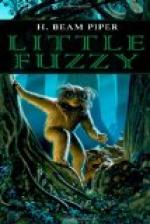In the late afternoon, two weeks after the Fuzzies had vanished, Marshal Fane dropped him at the hotel. They sat in the car for a moment, and Fane said:
“I think this is the end of it. We’re all out of cranks and exhibitionists now.”
He nodded. “That woman we were talking to. She’s crazy as a bedbug.”
“Yeah. In the past ten years she’s confessed to every unsolved crime on the planet. It shows you how hard up we are that I waste your time and mine listening to her.”
“Max, nobody’s seen them. You think they just aren’t, any more, don’t you?”
The fat man looked troubled. “Well, Jack, it isn’t so much that nobody’s seen them. Nobody’s seen any trace of them. There are land-prawns all around, but nobody’s found a cracked shell. And six active, playful, inquisitive Fuzzies ought to be getting into things. They ought to be raiding food markets, and fruit stands, getting into places and ransacking. But there hasn’t been a thing. The Company police have stopped looking for them now.”
“Well, I won’t. They must be around somewhere.” He shook Fane’s hand, and got out of the car. “You’ve been awfully helpful, Max. I want you to know how much I thank you.”
He watched the car lift away, and then looked out over the city—a vista of treetop green, with roofs and the domes of shopping centers and business centers and amusement centers showing through, and the angular buttes of tall buildings rising above. The streetless contragravity city of a new planet that had never known ground traffic. The Fuzzies could be hiding anywhere among those trees—or they could all be dead in some man-made trap. He thought of all the deadly places into which they could have wandered. Machinery, dormant and quiet, until somebody threw a switch. Conduits, which could be flooded without warning, or filled with scalding steam or choking gas. Poor little Fuzzies, they’d think a city was as safe as the woods of home, where there was nothing worse than harpies and damnthings.
Gus Brannhard was out when he went down to the suite; Ben Rainsford was at a reading screen, studying a psychology text, and Gerd was working at a desk that had been brought in. Baby was playing on the floor with the bright new toys they had gotten for him. When Pappy Jack came in, he dropped them and ran to be picked up and held.
“George called,” Gerd said. “They have a family of Fuzzies at the post now.”
“Well, that’s great.” He tried to make it sound enthusiastic. “How many?”
“Five, three males and two females. They call them Dr. Crippen, Dillinger, Ned Kelly, Lizzie Borden and Calamity Jane.”
Wouldn’t it be just like a bunch of cops to hang names like that on innocent Fuzzies?
“Why don’t you call the post and say hello to them?” Ben asked.
“Baby likes them; he’d think it was fun to talk to them again.”
He let himself be urged into it, and punched out the combination. They were nice Fuzzies; almost, but of course not quite, as nice as his own.




